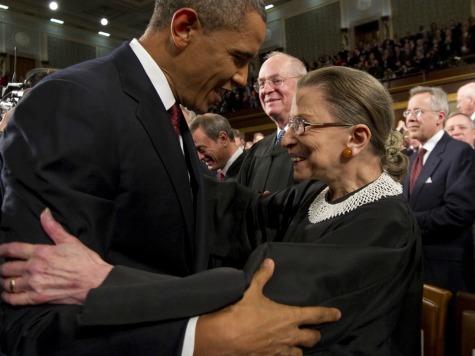
Supreme Court Justice Ruth Bader Ginsburg turned 81 on Saturday and remains one of the strongest voices on the court for liberal judicial thought. That did not deter one LA Times columnist from using her birthday to remind people that she is old and argue she should sacrifice her career to give President Obama one last Supreme Court pick.
“Justice Ruth Bader Ginsburg should retire from the Supreme Court after the completion of the current term in June,” wrote Erwin Chemerinsky in the LA Times on Justice Ginsburg’s 81st birthday. Chemerinsky, the dean of UC Irvine School of Law, is concerned that Ginsburg will leave her post after 2016, perhaps during a Republican administration, and squander away an opportunity to stack the bench in liberals’ favor.
He freely admitted that Ginsburg is “healthy and physically and mentally able to continue,” but dismisses that as a good reason for her to continue doing her job. Instead, Ginsburg should sacrifice the end of her career to the whims of partisan politics, lest the 2014 midterms not go so well for Democrats in the Senate.
Chemerinsky used examples to illustrate why her stepping down this summer, giving President Obama enough time to find a suitable replacement and Republicans not enough time to block a nomination into 2016, is so pivotal to the progressive movement. “If a Republican president selects Ginsburg’s replacement, that justice easily could be the fifth vote needed to allow the government to prohibit all abortions,” he wrote, citing Justices John Roberts, Antonin Scalia, Samuel Alito, and Clarence Thomas as a monolithic voting block on overturning Roe v. Wade. He concluded that Justice Stephen Breyer should also retire as soon as possible.
“Some might question whether a justice should be so calculating in choosing when to retire,” he concluded, “But not doing so ignores the reality that ideology matters enormously in Supreme Court decision-making.”
Chemerinsky’s calculation is based on a fallacy that the Supreme Court’s political dynamics work the same way as the other two branches’. To him, justices are either progressive or conservative in ideology the way congressmen and presidents are. Just as an older senator should retire in time to give a governor of the same party a chance to appoint a suitable replacement, Chemerinsky proposed justices should do the same.
The problem with this proposal is that it greatly misinterprets legal ideologies and conflates them with political ones. The Supreme Court is not an entity that defines itself by left/right dynamics, and to immediately align Ginsburg in such a way with the views of the Obama administration is to reduce her judicial interpretation to the petty whims of electoral politics. Supreme Court justices are not Democrats or Republicans, though they are appointed to their positions by people who live or die by those labels. As Justice Scalia, Justice Ginsburg’s best friend on the court, so eloquently put it: “Neither myself nor any one of my colleagues vote a certain way because he or she likes this president or he or she is a member of the party that president belongs to. I couldn’t care less who the president is.”
To the extent there is a dualist rivalry on the bench, that divide is between strict originalism–those who believe the law’s words are to be interpreted strictly and literally–and those who see the Constitution as an evolving document. And, yes, where that divide is concerned, Justice Ginsburg is furthest from the center on the Court in defending substantive due process and similar doctrines that require expansions of the definitions of laws. She is also among the most willing to use international jurisprudence to influence her own. But that does not make her beholden to a party line, or any party at all. To demand sacrifice from her in order to win a partisan battle is to belittle the institution she serves.

COMMENTS
Please let us know if you're having issues with commenting.